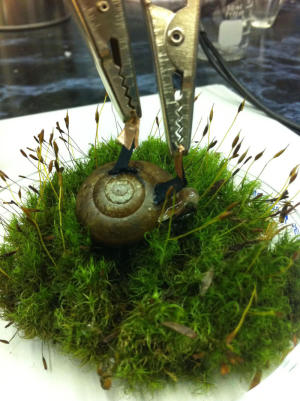Implanted Biofuel Cell Operating in Living Snail
 Researchers led by Evgeny Katz, the Milton Kerker Chaired Professor of Colloid Science at Clarkson University, have implanted a biofuel cell in a living snail.
Researchers led by Evgeny Katz, the Milton Kerker Chaired Professor of Colloid Science at Clarkson University, have implanted a biofuel cell in a living snail.This is the first incidence of an implanted biofuel cell continuously operating in a snail and producing electrical power over a long period of time using the snail’s physiologically produced glucose as a fuel.
The electrified snail, being a biotechnological living device, was able to regenerate glucose consumed by biocatalytic electrodes, upon appropriate feeding and relaxing, and then produce a new portion of electrical energy.
The snail with the implanted biofuel cell will be able to operate in a natural environment, producing sustainable electrical micropower for activating various bioelectronic devices.
Implantable biofuel cells have been suggested as sustainable micropower sources operating in living organisms, but such bioelectronic systems are still exotic and very challenging to design.
Research like this by Katz and other scientists is working toward a goal of creating insect cyborgs, an idea that has been funded by the U.S. Department of Defense.
Very few examples of abiotic and enzyme-based biofuel cells operating in living animals have been reported. Implantation of biocatalytic electrodes and extraction of electrical power from small living creatures is even more difficult and has not been achieved to date.
You can return to the main Market News page, or press the Back button on your browser.

